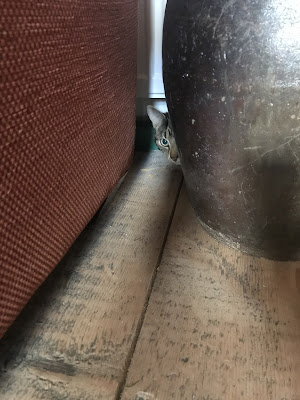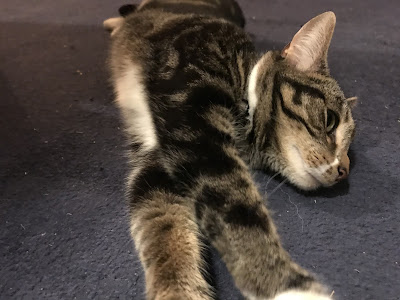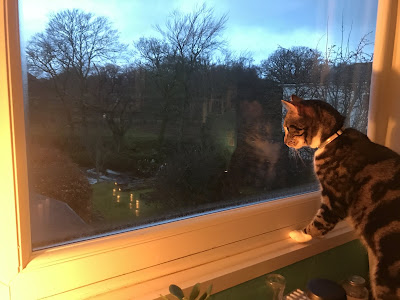We had decided that a module with 80 students is not a module with which you can easily do a fieldtrip, so we had decided to go virtual for our usual two days in the field. That plan had already brought us to a rainsoaked and windswept Cwm Idwal, and now it would take us to Red Wharf Bay. The module is Earth, Climate and Evolution, and the fieldtrips deal mainly with the first two of these.
This time, the weather couldn't reasonably have been any better. It was still February, but there was an almost cloudless sky! It was a little bit windy, but not too bad. This time it would only be Jaco and me, and the photographer. Katrien was otherwise engaged.
When I drove up I was met by Jaco who informed me that we couldn't park where we normally do, but he had found a layby that did the job too. While we walked up I received the result of the Covid test I had done on the way up; negatives, of course. Later that week I would go into the field with students, and I would have to be able to show I wasn't infected.
Because of the tide Jaco wanted to walk all the way to the end and then do all the filming on the way back, but we started with taking some drone footage, as we weren't sure the conditions would stay that good. There is a big lump of limestone towering over the bay, and only a drone can take a nice good look.
 |
| The beach looked amazing! |
When that was done we went to the end. There I did a little introduction, and then it was time to go look for some of the most recent deposits there (except modern beach sand, of course): Devensian till. Jaco had chosen to walk the slippery way. I'm not keen on falling on my face, so I avoided the seaweed, and got to the till without difficulty. The photographer wasn't far behind. I decided we had better use the time efficiently and just record a spiel about the glacial deposits without Jaco. I was just done when he reappeared. At least he hadn't slipped on the seaweed and got into trouble! He had just got distracted by nice fossils. A much more cheerful reason to go AWOL for a while.
We then went on to the best part of the beach; an ancient karst landscape with weird sandstone plugs, with adjacent a cliff made up of very organic shale, overlain by more sandstone and limestone. The contact between the shale and the sand is absolutely riddled with trace fossils! Here both Jaco and I did a spiel. I did the karst and he did the cyclothem, and the trace fossils.
 |
| The best part of the beach |
 |
| Jaco talking about stratigraphy |
Dragon isThen the best bit was over! We rounded things off by pointing out some fossil coral, and a weird layer of solifluction deposits. Jaco decided that he would record a voice over for the drone footage of the limestone cliffs; no point recording that standing on the ground. So that meant we were done!
Even though it had been a lovely sunny day with beautiful geology, I was glad we could call it a day; this way I could pop by the lab to pick up face masks for the next trip, and then get another Covid test, as the University requests two of these before any face-to-face contact. And that worked! I think the students will regret not having been on this trip, as quite unlike the previous outing, this one must have looked amazing in the recordings. But I think the University would not have been thanked if it would have sent many tens of students swarming over this rather popular spot!












































